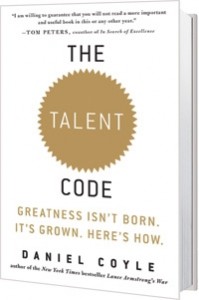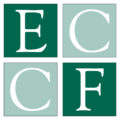Greatness isn’t born. It’s grown.
Ever dream of being a virtuoso singer, having a zero-handicap golf stroke, or cooking like a world class chef? Not in your cards? You just don’t have the natural talent, you say?
Not so fast. According to a burgeoning abundance of literature on the topic of talent and performance improvement, talent has, well, little to do with it.
Noting the sudden profusion of literature, recently, I became intrigued by the topic of performance improvement; that process that people go through when they want to be a better – or more talented – public speaker, marathon runner, or piano player. Ultimately, I found enlightenment, and encouragement, in Daniel Coyle’s 2009 offering.
 The Talent Code. For “The Talent Code: Greatness isn’t born. It’s grown. Here’s how.“, author Daniel Coyle traveled all over the world to what he calls talent hotbeds; those places, be they music schools, soccer camps, or little league programs, that seem to turn out a much greater number of experts or champions than chance alone could explain. He wanted to find the silver bullet. Did naturally gifted people simply gravitate to these programs or were there other factors at work?
The Talent Code. For “The Talent Code: Greatness isn’t born. It’s grown. Here’s how.“, author Daniel Coyle traveled all over the world to what he calls talent hotbeds; those places, be they music schools, soccer camps, or little league programs, that seem to turn out a much greater number of experts or champions than chance alone could explain. He wanted to find the silver bullet. Did naturally gifted people simply gravitate to these programs or were there other factors at work?
Coyle’s findings led him to the conclusion that nearly anyone can master almost any skill. People who are the most highly accomplished don’t necessarily start out with more capacity to learn or to perform. They simply obtain more of three required key elements: deep practice, ignition, and master coaching.
Deep practice intrigued me a lot as I can most readily affect it in my own life. (Although I’d certainly be remiss to not give master coaching its due!) Practice is something that we all know is good for us but we often don’t want to do enough of (ask my piano teacher). But deep practice is a special kind of practice.
Deep Practice involves three concepts:
- Chunking. The breaking down of any task into its component parts provides a system of organization and allows recognizable patterns to emerge. Once we have mastered individual chunks, we can link them together in one fluid stream to perform any task. Think about language. You are reading chunks of language on this page in the form of words and phrases. You have simply reached a level of reading mastery that you are no longer aware of the individual chunks. But when you were first learning to read, these discreet components or chunks were important.
- Repetition. We’ve all heard that practice makes perfect. But many of us don’t realize that the world’s masters have typically accumulated about 10,000 hours of practice by the time they reach expert or championship status. But time isn’t the only factor. Because of the circuits that are built in our brains when we practice – and what happens to those circuits when we don’t practice for a few days – consistent practice is more important that total quantity. Therefore, it is far better to practice for 10 minutes each day, than for 70 minutes once a week. This is true, especially as we get older.
- Learn to feel it. The identification of the target, the reaching, the slipping, the reaching again – it’s a process of deep feeling. You have to know your target and feel your mistakes. The whole thing requires great focus and concentration. It’s not just playing around. It’s the difference between quantity and quality.
My experience. I don’t play the piano very well. But whenever part of a song is giving me particular problems, I isolate those measures (chunking), and play them over and over again (repetition), noting and correcting the little mistakes and subtle hesitations that my fingers make as they move over the keyboard (learning to feel it), and my playing does get palpably better. I can see it in one practice session.
Science and bigger implications. There’s good science behind why deep practice works. In his book, Coyle explains the process that takes place in our brains when we are learning and engaging in deep practice. It’s pretty compelling, even for the non-science types.
But what fascinates me are the larger implications for our growing understanding of how we learn. Ever dream of being a virtuoso singer, having a zero-handicap golf stroke, or cooking like a world class chef? What about relating well with those that report to you? Being more appreciative than critical? Speaking up with courageous authenticity? Perhaps you just need to focus on more deep practice.
By the way, Daniel Coyle just published another book on talent that I am looking forward to reading. It’s called “The Little Book of Talent.”



[…] off of the research that he presented in The Talent Code, which I discussed here in September, Coyle’s newest book offers 52 mostly concise tips for improving your skills in … […]